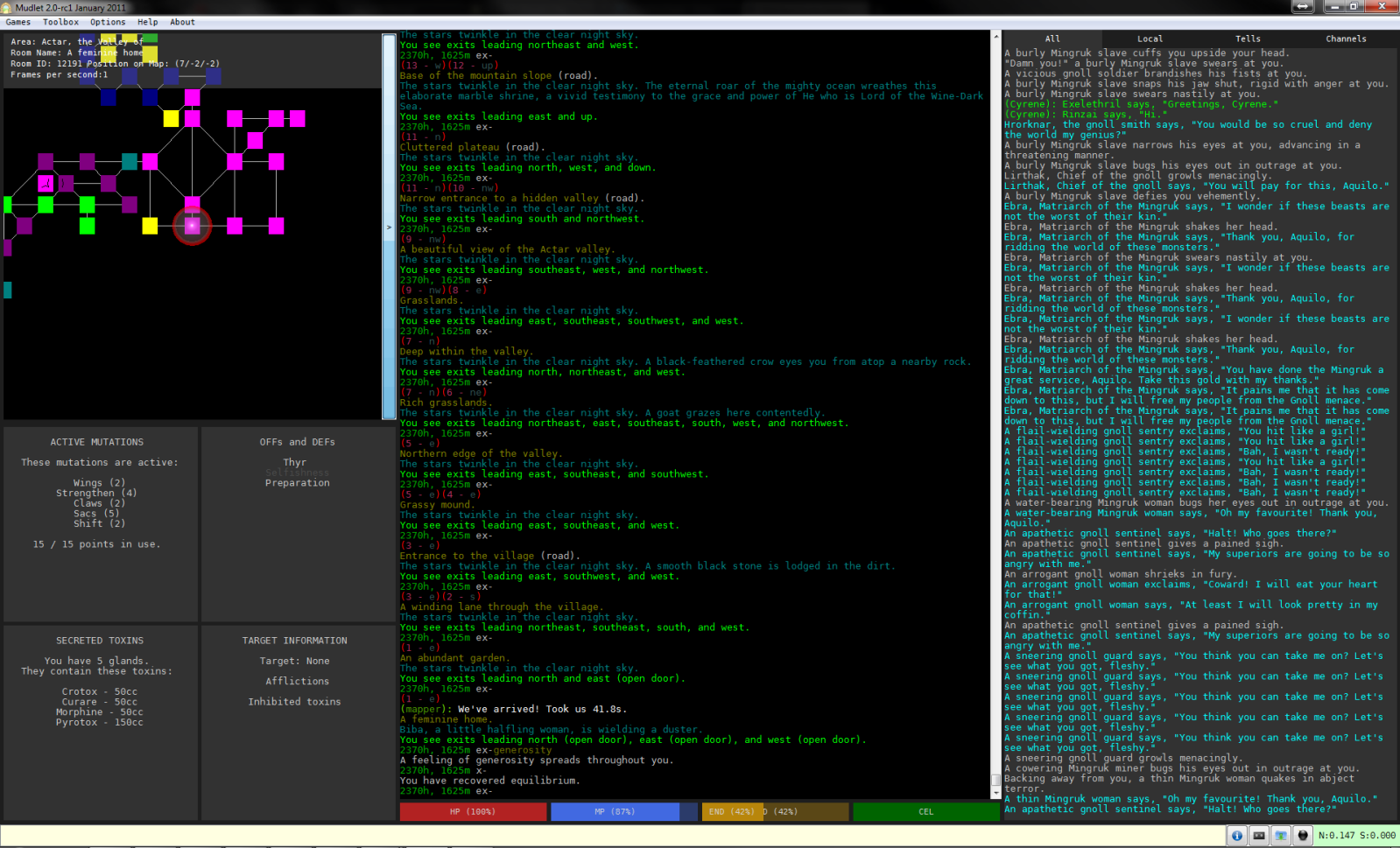
Overall, it's amazing that folks have put as much work as they have into this project, but it's nearly impossible to figure out how to use any of it.

I created a basic script that declares them on startup each time. Checkmarking them is supposed to save them, but it doesn't work. Variables get deleted at startup for some reason.
#MUDLET CREATE ALIAS CODE#
Or if I see the echo, then I'll know my code is silently failing. Aliases are strings of information that, when run successfully. I've used this countless times to discover that my keybinding or whatever wasn't even firing. One of the easiest functions in Mudlets scripting environment are what are called aliases. If you're wondering if your scripts is even firing, copy-paste all your code to a notepad file, then delete it all from Mudlet and replace it with echo("I'm working!"). However, setAreaName(001, "MyArea") with the quotation marks works perfectly because that's the syntax the function needs. You may use / as a separator for multiple commands.
That can be done with kconfig bashing razecommandAdditionally you need to configure the command used for auto razing. This will enable switching the command used when the denizen you attack shields. No error or indication that it even tried to run. First turn the auto raze option on, using the alias kconfig bashing raze. For example, setAreaName(001, MyArea) seems to do nothing. If it exists, it can be called from any alias, trigger, etc. Re open mudlet all settings are back to default all triggers lost. click the X still get a do you want to save box, I click yes. I click the save button, go to triggers makes a few triggers click save. I installed mudlet, check enable gmcp and force autosave on exit. If you make an alias to do 'display (gmcp)' you'll see the contents of the table. I had to do a factory reset of my machine. Other alterations to child containers might be. To adjust the width of the first column, in the script at line 10 and 14, adjust this value to increase or decrease width. To fix common issues, go to your scripts folder, select layout and in the script try the following. GMCP data is stored in a table called 'gmcp' and updates every prompt (for the most part). 1.This script currently tries to adjust for multi screen resolutions. Check it, close Mudlet, open Mudlet, and log in. For example, I created a keybinding (ctrl-W) called DoSomething, and it calls whatever function I'm wanting to test at the time.Īny Lua function in any script is fair game. There's a checkbox down under 'GMCP' which reads 'Enable GMCP'. They have to be called in a trigger, or keybinding, or alias, or something like that. You can't call Lua functions from the main console. Here are some general learnings for anyone else stumbling on this thread X years from now: In my case, it was a local function, so it couldn't be called outside of the script. :pįor what it's worth, I figured out what was going on here. Now I wonder how to best bring the joy of these games to the retro players of this community? What needs to be done to make Mudlet available on RetroPi? I can try find and link more information as you need, but just didn't want to come off all spamming here.Thanks. Go to Scripts, click Add Item, and create your variables like so. There are also quality of life functions like a mapper system available. Choose any name you like for your alias (e.g., Add Enemy Alias), and then define. The interface is very quick and lightweight but can be heavily influenced with CSS and special lua commands. In Mudlet all aliases are compiled in Perl Regex format. Aliases are strings of information that, when run successfully, call a specific code. That is, I can make 'tg' send 'Take gold from pack', but I cant make 'en' do 'enemy.

Mudlet client adds more features to your gaming experience like automation through triggers, lua scripts and events, as well as simplified entry with aliases. One of the easiest functions in Mudlets scripting environment are what are called aliases. I figure that even if setting up a whole 'set target/enemy script' is considered automating which, bracketing the entire debate on the subject, is just not something I want to do, I also cannot figure out what the syntax is making an open-ended alias in Mudlet. Most have amazing gameplay and very vivid graphics (your mind). You can find lists on MudConnect or TopMudSites for example. Vadi: 07:03 A mudlet package is basically an export of aliases, trigger, scripts, key bindings. There are tons of games out there, some dating back 20 or 30 years already, others quite newly released. And Im like, hey can you add this and this to mudlet. If you don't know these games, they are played not by joystick or controller but with keyboard mainly, as they consist mostly of text, like: get lamp This week the Mudlet project has released a version of their game client which can be used on Raspberry Pi.


 0 kommentar(er)
0 kommentar(er)
